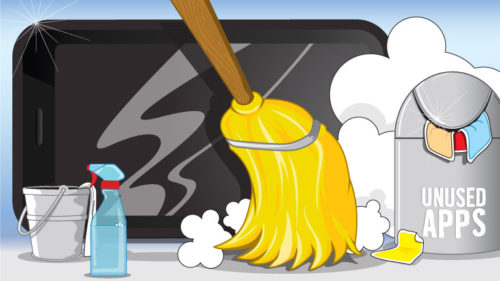Just like there are hoarders in homes, you have smartphone data hoarders. I know I’m guilty of e-hoarding when it comes to my emails, so I am fessing up…“My name is Karen, and I am a smartphone data hoarder!” I have countless undeleted emails and texts that are just taking up space on my phone. Pure insanity! Yes, I know, I should probably rush out and enroll in a 12-step program.
Well, there are a few things you anti-tech cleaners can do to delete the electronic info in your smartphones that no longer matter. Spring decluttering a smartphone will help to improve performance, speed, and efficiency.
So what are you waiting for?
And as an afterthought, for those 50-plus folks who are not tech savvy, and can’t figure out how to perform any of the following suggestions, you can always turn to YouTube, Google, your kids, or the grands for help.
Happy smartphone spring decluttering!
Go for it!
Recognize the fact that your phone is a portable computer. You’ve got banking, scheduling, sensitive medical info, emails, [etc.] on it. Removing unnecessary files from a phone allows the freeing up of space.
Delete apps, photos, videos, messages
Smartphone slowdown is real. If you’ve accumulated digital clutter on your device, there’s an easy fix: Delete it. Take a moment to go through your phone and get rid of any apps that do the same thing—or those you thought looked cool but in fact, never used.
Uninstalling useless apps will free up phone storage space and might even speed up your phone. Check your messages for old videos and photos wasting space in storage and remove those too. Remember to include unimportant outgoing messages in the purge. Photos you’ve sent friends and family are usually already stored somewhere else on your phone, so get rid of any duplicates that take up much-needed memory.
If you still want to hold on to some photo/video faves, consider iCloud or Google Photos. iCloud is the storage platform behind Apple’s Photos app, whereas Google Photos offers storage as well as its other features. Just FYI, iCloud boasts impressive sync capabilities, offline photo access, and easy management and backup, even for gigantic libraries.
Clear cache, cookies, and history
Clearing your web browser’s cache, cookies, and history may remove data such as the following:
- Saved passwords
- Address bar predictions
- Shopping cart contents, etc.
While you should clear your web browser’s cache, cookies, and history periodically in order to prevent or resolve performance problems, you may wish to record some of your saved information first.
Turn off location services and app updates
Disable both automatic location services and app update functions in settings. Only update apps when you choose and enable location when an app such as navigation requires it.
Kill old texts
According to research, the average user picks up their device more than 1,500 times a week. Even before we get out of bed, chances are the majority of us will check or send a text or two to friends. So, should you delete old text messages? The answer is YES because they are no longer a part of your life! By deleting your text messages regularly, you can free up space and practically make your phone work faster.
Refresh your contact list
Scroll through an alphabetical letter a day and eliminate anyone you don’t remember, has passed away, or whom you have not spoken to since the year of the flood!
Turn off notifications
Review notifications app by app as this will cut down on banners and sound alerts to minimize distraction. And here’s an ultimate power tip for those who are not severely addicted to their phones: Turn off notifications on all apps and only look at the phone when you want to do so.
Try turning it off and on again
Since we use our phones for nearly everything, they’re rarely switched off. However, just like a computer, phones need a hardware refresh and some downtime. Turn off your phone at least once a week. The device will love you for it and perform better.
Don’t forget to disinfect!
Your phone, like your hand, is a bacteria and virus magnet. To avoid infection, you must sanitize your phone regularly. As long as you use a screen protector and don’t submerge your phone in any liquid or allow moisture into any phone openings or charging ports, your phone should survive disinfection.
Follow the phone manufacturer’s instructions and disinfection guides. For example, Apple and Samsung recommend using Clorox wipes, 70% alcohol wipes, or 70% alcohol solution on a soft microfiber cloth, then wipe the exterior of your phone.
To reduce the risk of damaging the phone, wipes may be a better alternative than sprays. By using a spray, the solution may pool on the phone and cause internal damage.
